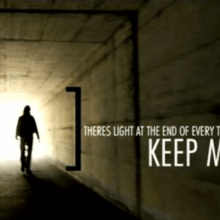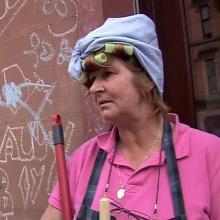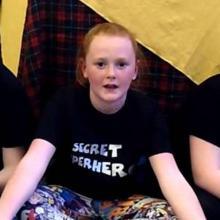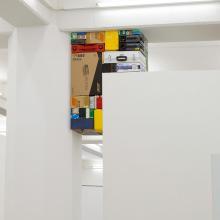North Ayrshire Council Addiction Services (NACAS) Creative Arts Project has been running for a number of years. Art therapy is a method of addiction treatment that uses the creative process to improve and enhance the physical, mental, and emotional well-being of recovering individuals. The creative process of artistic self-expression helps recovering individuals to address personal issues, develop healthy social skills, learn self-management of certain behaviours, combat stress, increase self-esteem, and gain personal insight and self-awareness.
For this arc of the Creative Arts Project we decided to write, design and perform a play focusing on the subject of recovery.
Evidence
Creative art therapy is a proven method of addiction treatment that uses the creative process to improve and enhance the physical, mental and emotional well-being of recovering individuals. NACAS has the experience of delivering arts and craft themed interventions, the outcomes of which have helped individuals in their recovery and helped facilitate lasting change. Aside from this group there is no other art therapy available to those specifically in recovery in North Ayrshire.
Funding and partners
Funding of the project had been through the Big Lottery Fund however this came to an end last year and funding for the Recovery Play was secured through the ADP (Alcohol and Drug Partnership).
Who runs it?
The group is run with social services (addictions) staff and a professional freelance artist/writer. However, participants are encouraged to share their ideas and take ownership of the project. Staff participate and offer guidance where appropriate. Facilitators did not want the group to be too structured or formal and wanted to encourage a creative environment within which participants could craft their own ideas.
How do people hear about it? How are they referred?
There is an open referral system for those who are in recovery. The majority of referrals are from NACAS and NHS (Addictions). Individuals need to be actively working towards their recovery and a substantial proportion of referrals are signposted from completed groups.
All participants were at a stage in their recovery where they wanted to participate in a group which told their story, developed their creative side and introduced them to a new interest. They were also keen to participate in a project where they were being heard and encouraged to take ownership.
What type of arts intervention?
We wanted to diversify from a generic art group into a writing group and the theme of recovery stories was suggested to give a relevance and a focus. It was felt that making and using puppets provided the wanted element of anonymity.
An overwhelming personal choice was to use the art of puppetry in the telling of the play. This medium provided much wanted anonymity in the re-telling of personal stories and ideas. The participants were keen to mix fiction with nonfiction and to include humour and pathos. An outing to the Scottish Mask and Puppetry Centre was arranged to educate on the ethos of puppetry, research production and stimulate ideas. The group is designed to encourage and support the individuals involved to take ownership of the project through valuing their opinions and peer support.
How did you design your sessions?
Sessions were held on puppet making, characterisation, journal writing, bibliotherapy, script writing/development, set design, film and audio recording, editing. Sessions were designed where there was an introduction and reflection on the previous week and any issues that may have arisen and then a continuation of work. We started the project with a visit to and participated in a workshop at the Scottish Mask and Puppetry Centre in Glasgow to generate ideas. We started with puppet making and the characters naturally developed through this process.
What are the outcomes?
There was a hugely positive outcome from participant evaluations. The average score of 2/10 on initial evaluations raised to an average of 8/10 on final evaluation. All participants are keen to maintain involvement in creative programmes and develop personal projects. Substantial progression was recognised in problem solving, confidence, communication skills, self-management and social inclusion.
Participants felt they learned a wide range of skills around the planning, preparation, writing, design and production of a play as well as feeling a rise in confidence, self-management and social inclusion.
- Improved self-management
- Progression in confidence and self-esteem
- Demonstrate better communication / social interaction skills
- New skills introduced while building on existing strengths
- Provision of diversionary activity
- Increased peer support and social inclusion
- Developed skills in problem solving
- Display a wider understanding of the therapeutic aspects of creative art
- An increased awareness of and access to a wider support network
Facilitator’s comments:
“This project proved to be a lot more challenging than originally thought as there was a lot more stages to film making than expected which incorporated many different skills. It became an interesting journey both for the facilitators and participants. Reticence over the writing aspect of the group decreased as the facilitators adapted the focus from a writing group to using tactile materials to stimulate ideas. Tactile working is a proven medium in stimulating thoughts and designs.”
How is quality and effectiveness measured?
We monitor individual development, gather self-perceptions, evaluate effectively and encourage movement onto other groups/projects.
For evaluation, we use an 8 point 1–10 scale questionnaire at the start and the end of the group to evaluate progress. A challenge can be that self-evaluation can differ from facilitator evaluation. In collating the information it must be remembered what specifically is being evaluated and sticking to the aims and outcomes. We are currently disseminating the results of our evaluation and are preparing an action plan to improve program performance.
What are the (general) challenges?
Group dynamics, attrition rates, literacy skills, behaviour.
What are your good practice and learning points?
The idea was to provide the opportunity for individuals to interact within a semi-structured environment using a creative medium to explore issues around the theme of recovery and to produce a piece of performed prose that, whether fiction or non-fiction, would symbolise issues of recovery.
Key good practice points:
- Use and mirror appropriate communication skills.
- Know when to intervene/encourage
- Be aware of facilitating the group NOT running it ie. allow participants to take ownership.
- Acknowledge and identifying skills of participants
- Encourage, develop and endorse participants ideas and skills
- Encourage peer support
- Encourage self-exploration and disclosure as appropriate
- Make things visual – this helps people to have ideas




